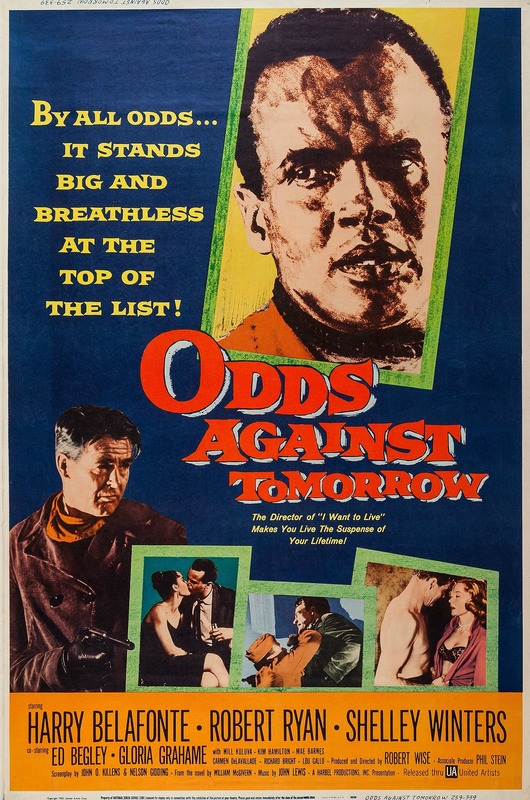
Odds Against Tomorrow (1959)
Odds Against Tomorrow is a 1959 film noir produced and directed by Robert Wise and starring Harry Belafonte. Belafonte selected Abraham Polonsky to write the script, which is based on a novel of the same name by William P. McGivern. Blacklisted in those years, Polonsky had to use a front and John O. Killens was credited. Polonsky’s screenwriting credit was restored in 1996 in his own name.
Director – Robert Wise
Writers – William P. McGivern (based on a novel by), Abraham Polonsky (screenplay by), Nelson Gidding (screenplay by)
Cast –
Harry Belafonte as Johnny Ingram
Robert Ryan as Earl Slater
Shelley Winters as Lorry
Ed Begley as David Burke
Gloria Grahame as Helen
Will Kuluva as Bacco
Kim Hamilton as Ruth
Mae Barnes as Annie
Richard Bright as Coco
Carmen De Lavallade as Kitty
Lew Gallo as Moriarty
Lois Thorne as Eadie
Wayne Rogers as Soldier in bar
Zohra Lampert as Girl in Bar
Allen Nourse as Police Chief
Watch “Odds Against Tomorrow” (1959)
Plot
David Burke is a former policeman who was ruined when he refused to cooperate with state crime investigators. He asks Earle Slater, a tough ex-con and racist, to help him rob a bank, promising him $50,000 if the robbery is successful. Burke also recruits Johnny Ingram, a nightclub entertainer, who doesn’t want the job but who is addicted to gambling and deeply in debt.
Slater, who is supported by his girlfriend Lorry, learns that Ingram is black and refuses the job. Later, he realizes that he needs the money, and joins Ingram and Burke in the enterprise. Tensions between Ingram and Slater increase as they near completion of the crime.
On the night of the robbery, the three crooks are able to enter the bank and abscond with stolen money. Burke is seen by a police officer when leaving the scene of the raid and is gunned down in the ensuing shootout. He then shoots himself to avoid capture. Slater and Ingram fight each other while evading the police. They escape and run to a fuel storage depot, chasing each other onto the top of the fuel tanks. When they exchange gunfire, the fuel tanks ignite, causing a large explosion. Later, when police survey the scene, Slater’s and Ingram’s burned corpses are indistinguishable from each other. The film ends with a shot of a sign at the entrance of the depot reading “STOP—DEAD END”.